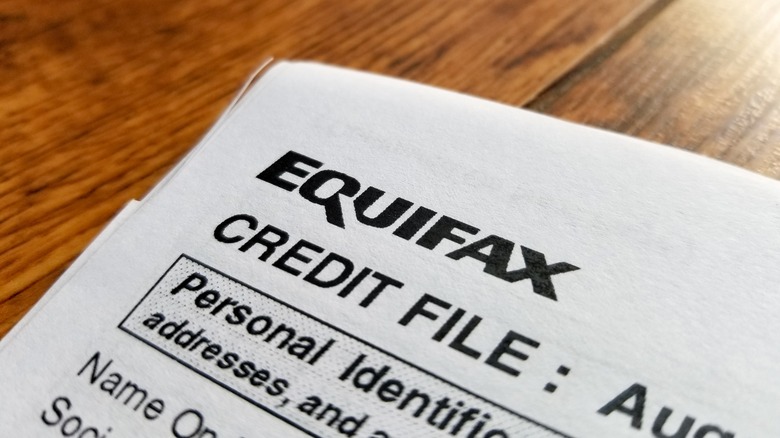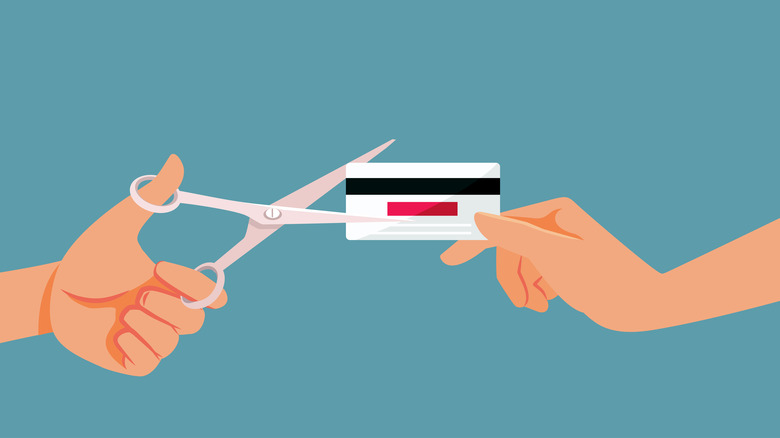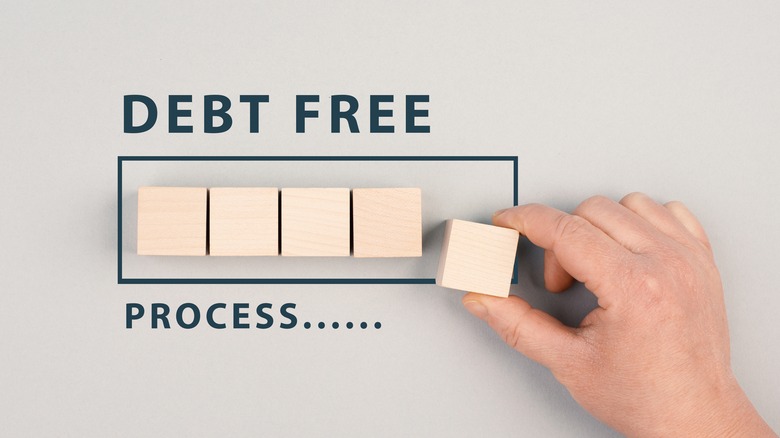Debt Myths You Really Need To Stop Believing
Debt is a scary word, confined to the darkest recesses of the adult mind. Thinking about debts is a stress-inducing practice for many, and talking about them? Forget about it. Debt worries plague millions of Americans, but the reality is that almost every single American consumer participating in the contemporary economy owes at least some kind of debt. This may be in the form of a car loan, mortgage, or student loan; but it could equally be a credit card bill or one of many other repayment formats. Even renters who have signed a lengthy lease have entered into a promise to pay a set fee each month. While this isn't a debt unless you find yourself behind on rental payments, the obligation to meet this promise every month can feel like the same kind of weight, especially if money is tight.
Because debt can be such a stigmatizing thing to talk about, many myths continue to swirl around the minds of consumers. Some may have been based on a factual grounding and become twisted with time, while others were never solid approaches to good money management. Good financial stewardship starts with arming yourself with the knowledge necessary to make good financial choices. With that in mind, these are some of the most pervasive debt-related myths that you need to stop believing to build strong financial literacy and a solid grasp on your monetary future.
Only bad people have bad credit scores
The first, and perhaps most damaging myth that has continued to persist throughout modern consumer history is that bad credit scores somehow act as a reflection on the people who have them. The reality is that credit in no way indicates the type of person you are. Anyone can fall victim to some of the poor money management habits that result in less-than-stellar credit scores. A wide range of factors play a role in credit scoring models, and as a result, a variety of bad financial habits can translate into reductions in your credit score.
Just because you might be facing a poor credit score doesn't mean you are any less than others. Credit scores reflect your lending history and money management habits, and that's it. Everyone wants to see a good score when they look it up on their credit card app or request a copy of their credit report. Yet, a bad score shouldn't dissuade you from chasing after the things you want in life, including a reduction of your existing debts and better financial stability overall. Even if you're reckoning with a poor credit score, you can still make big strides toward improved financial stability, and indeed you should.
Paying down a debt will instantly fix credit history issues
Anyone taking serious stock of their credit usage and working toward paying down existing debts will no doubt be excited about the positive impact that will come to their credit score. Improving your credit utilization figure (by paying off credit card balances and refraining from new usage) will create positive movement for your credit score, but it won't wash out negatives that appear on your credit history. Things like multiple hard credit checks will remain on your credit history for two years, potentially dragging your score down for much or all of that period, in case you plan to take out new loans.
Likewise, if you've missed loan payments in the past and the inactivity has been reported to the credit bureaus, you're likely looking at a seven-year window before they are rinsed from your history. Even if you pay off your existing debts in their entirety, negative factors found on your credit report will remain in effect until they are cleared away with time. There's no getting around that reality, but that doesn't mean that paying off debt won't make a positive impact on your score in the meantime.
All debt is bad debt
It's easy to lump all debts together into one composite thing and proclaim them to be 'bad' for personal finance. While owing a debt is certainly less appealing than living life totally debt-free, almost no one can truly claim to be completely unencumbered by a financial repayment obligation of some kind. Moreover, not all debts are created equal. Many millions of young people have made their way through college with the help of student loan financing, a credit product that comes with a very low interest rate in comparison to most other lending products available. For the 2023-24 school year, undergraduate rates for federal student loans are 5.50%. That's a far cry from the 24.46% average rate for credit cards, as of the end of October 2023, or even mortgage rates for that matter, sitting at an average of 7.69% in November 2023.
Borrowers can focus their efforts at repayment on whatever lending product they desire, as long every monthly payment is met and accounts stay in good standing. If you're juggling a mortgage and two credit cards, paying off the highest-interest loan first will save you the most in interest additions. While everyone dreams of owning their home free and clear one day, prioritizing overpayments on the mortgage rather than eliminating your revolving credit card balances is the wrong approach to debt management.
Marriage merges debts and credit reports
Getting married creates a new, entwined financial state for two previously independent people. However, this doesn't mean that old debts are brought into the fold, too. Spouses aren't responsible for debts that their partner created all on their own, before their fiscal behaviors were comingled. In the event of a divorce, or even a death, you aren't personally liable for any debts created solely by your partner. Similarly, if your spouse were to die, creditors cannot typically use the benefits of a life insurance policy or the person's retirement accounts to make themselves whole.
Marriage also doesn't co-mingle credit reports. Just because your spouse has great credit doesn't mean that you automatically see a gigantic leap in your own credit score, or a retraction of negative records on your credit report. Therefore, it's important to keep track of your own credit history and continue using credit products — responsibly — after you are married, even if you plan to rely primarily on your other half for joint money management considerations.
Late payments immediately harm your credit score
One of the few realities that is more beneficial to consumers than the myth might have you believe, late payments are often misunderstood by credit users. A payment is absolutely "late" if it isn't paid on time. But a late payment and the resulting reporting of one that would eventually show up on your credit report are not the same thing.
In terms of credit reporting, a late payment is only typically reported to credit bureaus if it extends beyond around 30 days late — functionally, if you miss two payments in a row. Creditors tend to be fairly lenient with borrowers when it comes to reporting damaging information that will stick with them for many years, and it takes a bit of effort to report late or missed payments. These two facets combine to give borrowers a bit of a grace period when it comes to late payment reporting. But, there's a gigantic caveat that can't be forgotten when considering making a payment after its due date. You may lose favored interest rates if you miss a payment cutoff date, making future borrowing against the line of credit more expensive. You'll also likely incur a late fee, which will add to the total you have to repay. If you're already going to be late, chances are the added expense might serve only to dig an even deeper financial hole that's that much harder to manage long-term.
Credit cards are a viable means of weathering a financial emergency
A credit card can act as a lifeline in an emergency, but it should never be your first port of call if you can help it. Credit cards are beneficial in many ways, including as cash-back vehicles or reward point builders when used responsibly. However, falling back on your line of credit in an emergency only creates a more unstable financial situation moving forward. The ripple effect created when you use a credit card to cover the cost of something you can't afford today only serves to build further instability in your financial balance over the long term.
Instead, building your emergency fund should be made a priority. If you have the cash sitting in the background to deal with a minor, or even moderate emergency, spending with your credit card to take advantage of the reward opportunity and then immediately paying it back can be both financially sound and immensely satisfying. Ideally, you'll never need to rely on your emergency cash, and it can simply sit around collecting interest. But this just isn't the reality of emergency circumstances: They creep into the picture often at the worst possible times. If you must use your credit account to cover a sudden expense however, make sure you do everything in your power to pay it off as quickly as you can to avoid a future financial struggle right on the heels of the first hardship.
Retail credit accounts are the same as traditional credit cards
Retail credit accounts seem like a great idea when you're lining up to check out at a furniture store or consumer electronics outlet. You may even be offered financing terms when purchasing a new iPhone, laptop, or appliances online, too. These can be a useful way to take advantage of low interest rates (sometimes even 0%) over a quality timeline that makes repayment far more manageable. However, taking out a line of credit with a retail outlet can be a risky decision. The offer is structured much like a credit card, but the terms are often wildly different. Instead of the zero-interest offer behaving as you might normally expect — with the purchase accruing zero interest throughout the promotional period — these accounts instead act as repayment plans. What that means is you'll have the introductory period to pay off the debt in full, or you'll suddenly find yourself on the hook to pay down the entirety of the interest that would have accrued had the account been charging it at the full rate.
To make matters worse, interest rates on retail credit card accounts can be even higher than the already astronomical APRs offered in standard credit card agreements. If you're thinking of financing a new purchase through one of these kinds of offers, make sure you read the fine print carefully and prepare yourself to pay off the items in full before the offer term expires.
Closing credit cards you no longer use will improve your credit score
Many consumers think that holding onto unused credit cards is a good way to fall back into the trap of building up mountains of debt. This can be especially potent for those who have fought hard to eliminate the poisoned fruits of overzealous spending in the past. However, closing out unused credit cards can actually reduce your credit score, especially if they are older accounts that you've held for many years.
There are two factors that see alteration upon the successful elimination of a credit card account. First of all, your available credit will be reduced. Lowering the amount of total credit you have available naturally inflates your utilization rate, potentially throwing this figure into a different category within credit scoring models and sending your score plummeting. Similarly, by closing down an account, you also change the average age of your credit accounts, potentially making it much younger in the process. The age of your oldest account, and the average across all of them is an important feature in determining your credit worthiness, because it indicates how long you've been a trustworthy borrower, as well as provides some insight into your general usage of new versus older lending products. Unless there are some unique circumstances at play, closing an account won't improve your credit score, and it will often impact it negatively instead.
You should pay off all debts and take on no new credit
Not all debt is created equal, so thinking of every lending product you've utilized as all part of the same general pool of money owed back to lenders isn't a beneficial way of approaching borrowing. Mortgage loans, personal loans, and other kinds of debts are generally much less expensive than credit card debt, making these repayments the priority for anyone getting serious about reducing or eliminating their debt burden. Overpaying on your credit cards while keeping up with monthly contributions on other, fixed-term loans should be any borrower's strategy when dealing with the burden of existing credit.
One myth that continues to persist in the financial ether is that once you've finally gotten out from under the weight of credit card debt, cutting up your cards and swearing off using them ever again could prove extremely beneficial. In reality, if you suddenly stop utilizing lending products, your ability to gain access to future borrowing opportunities may be limited. It's a good idea to use your credit cards every once in a while to show a steady stream of responsible debt management over the long term. Even if you just buy gas for your car or one week of groceries a month with your card and then pay it off, you'll be building toward rock-solid credit that continues to provide future opportunities when the time comes to move or purchase a new car.
More wealth (or a better job) equals a better credit score
In the same way that your credit score and history don't reflect on the person you are, they also aren't affected by the job you hold or the money you possess. Wealthy people and those with high-paying jobs aren't given a leg up when it comes to credit scoring. The same is true for those who've been fortunate enough to inherit wealth from their families. Credit scores don't take race, religion, social status, or any other personal factors into consideration, and instead work to provide a bias-free assessment of your ability to borrow money and repay debt obligations. Of course, these won't ever be perfect, but the truth is that job titles and wealth won't improve your credit score — or reflect negatively on it. A promotion to a new role can only influence your credit if you utilize the newfound salary bump to pay off debts at a faster pace.
Only making minimum payments is alright
Minimum payments are one of the credit card industry's greatest traps. It's easy to get your bill and think, "Oh, it's 50 bucks, I can manage that." Only making the minimum payment is the best way to ensure that you'll consistently pay enormous markups on your credit card bills — even for the smallest purchases. Not only will paying the minimum every month ensure that you pay off the debt over many, many years rather than months, but they will cost significantly more than if you paid in cash or tackled the debts more responsibly. Minimum payments often come as a percentage of the total principal and can be minuscule concerning the overall balance owed. Even paying double the minimum payment can drastically change the math of your debt burden. The interest added on after your billing cycle closes might be almost as much as the minimum required contribution, essentially freezing your balance in a state of limbo, assuming you also aren't continuing to use the card for new expenses.
The best way to tackle credit card usage is to only charge what you can pay back in full. But if you've already dug yourself a hole, don't make any new purchases on the card, and get serious about overpaying your debts. It will likely save you thousands of dollars over the long run.











